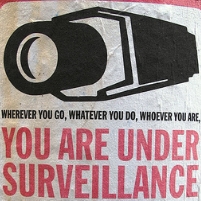Appeals Court Rules Justice Dept. Must Reveal Details of Warrantless Tracking of Cell Phones
Thursday, September 08, 2011
 (graphic: crimethinc.com)
(graphic: crimethinc.com)
Civil libertarians won an important victory in federal court on Tuesday involving the government’s use of cell phone data to track suspects without a warrant.
Since the September 11 attacks, U.S. intelligence and federal law enforcement agencies have increasingly spied on individuals and organizations, some of which involved the collection of cell phone location data to track suspects without authorization from a judge. The American Civil Liberties Union (ACLU) has argued that this information collecting should be made public in many instances once cases have been closed.
However, the Department of Justice refused to turn over records to the ACLU, prompting it to file a lawsuit. A three-judge panel of the U.S. Court of Appeals for the District of Columbia ruled in favor of the ACLU, saying the public’s interest outweighed any privacy concerns raised by the government over its warrantless wiretapping.
“The disclosure sought by the plaintiffs would inform this ongoing public policy discussion by shedding light on the scope and effectiveness of cell phone tracking as a law enforcement tool,” wrote the judges in their 35-page ruling. “It would, for example, provide information about the kinds of crimes the government uses cell phone tracking data to investigate.”
According to the ruling, the government must release the docket information in cases where there was a conviction or public guilty plea. Exceptions to this requirement include those cases resulting in an acquittal or dismissal, or those sealed for national security purposes. In these instances, a lower court must re-examine the issue of releasing the specific information.
Catherine Crump, an ACLU attorney who argued in the DC Circuit, told The Blog of the Legal Times: “Americans have a strong interest in understanding when and how our cell phones are being converted into tracking beacons by the government without a warrant, which apparently has become a common practice. Tracking someone’s location 24 hours a day for days on end can reveal very private personal information, and the government should not be able to do it without a strong suspicion that it will turn up evidence of a crime.”
-Noel Brinkerhoff
Court: Some Data on Government Cell Phone Tracking Should Be Public (by Bill Mears, CNN)
Federal Appeals Court Upholds Disclosure of Cellphone Tracking Data (Blog of the Legal Times)
ACLU v. Department of Justice (U.S. Court of Appeals, District of Columbia) (pdf)
- Top Stories
- Unusual News
- Where is the Money Going?
- Controversies
- U.S. and the World
- Appointments and Resignations
- Latest News
- Trump Renames National Football League National Trump League
- Trump to Stop Deportations If…
- Trump Denounces World Series
- What If China Invaded the United States?
- Donald Trump Has a Mental Health Problem and It Has a Name






Comments